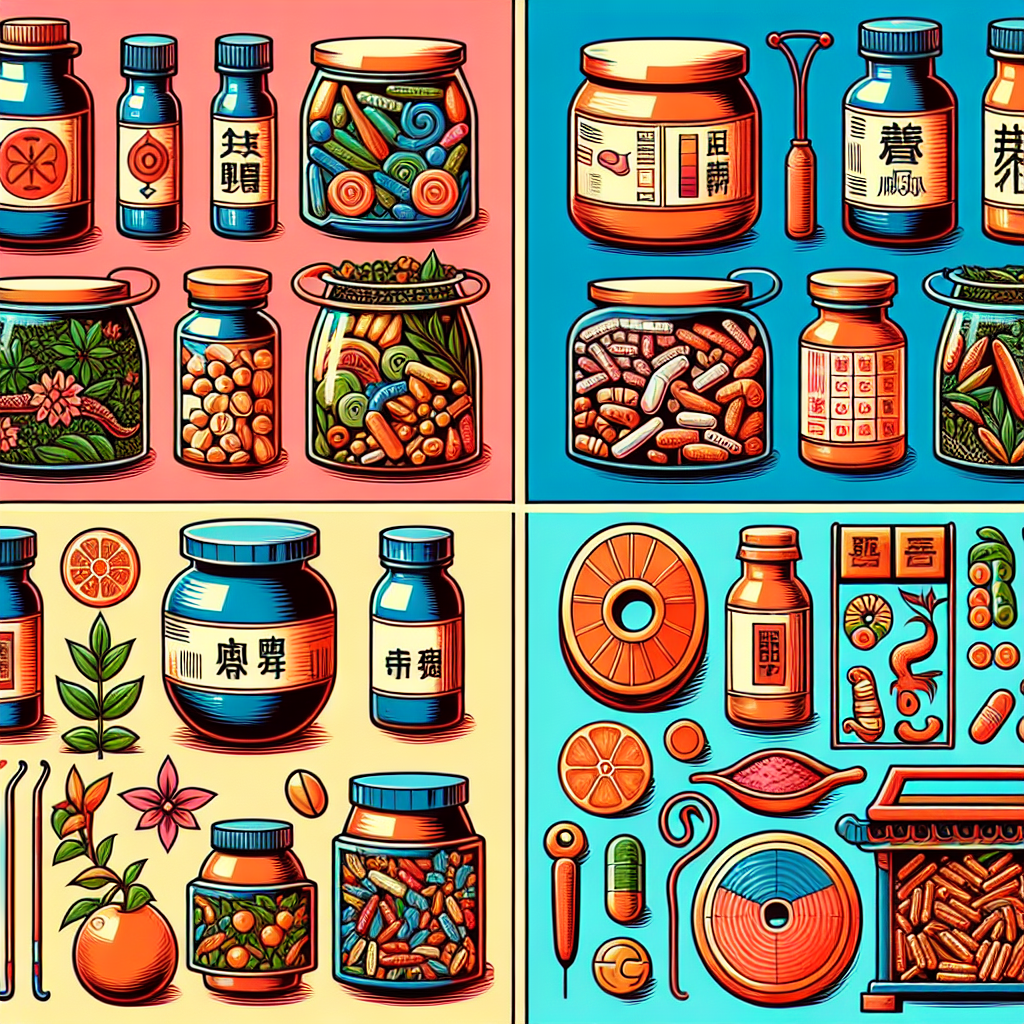Vitamins in Ayurvedic and Traditional Chinese Medicine

Discover the power of vitamins in Ayurvedic and Traditional Chinese Medicine. Unleash your body’s potential for healing and wellness. Visit My Vibrant Vitality today.
Exploring the Role of Vitamins in Ayurvedic Medicine
Vitamins are essential nutrients that our bodies need in small amounts to function properly. They play a crucial role in maintaining our health and wellbeing, and their deficiency can lead to various health problems. While modern medicine has made significant strides in understanding the role of vitamins in our health, traditional systems of medicine, such as Ayurveda and Traditional Chinese Medicine (TCM), have long recognized their importance.
Ayurveda, a 5000-year-old system of medicine originating from India, emphasizes the importance of a balanced diet for maintaining health and preventing disease. It recognizes that vitamins, along with other nutrients, are essential for the body’s proper functioning. However, instead of focusing on individual vitamins, Ayurveda takes a holistic approach, emphasizing the importance of a balanced diet that provides all the necessary nutrients.
In Ayurvedic medicine, food is considered medicine, and it is believed that a balanced diet can provide all the necessary vitamins and other nutrients that the body needs. Ayurveda categorizes foods into three types based on their effects on the body: Sattvic (pure), Rajasic (stimulating), and Tamasic (dull). Sattvic foods, which include fruits, vegetables, grains, and dairy products, are considered the most beneficial for health as they are rich in vitamins and other essential nutrients.
Ayurveda also recognizes that different individuals have different nutritional needs based on their unique body constitution, known as Prakriti. This is determined by the balance of the three Doshas – Vata, Pitta, and Kapha – which are the fundamental energies that govern our physiological functions. Depending on one’s Prakriti, certain foods and vitamins may be more beneficial than others. For instance, individuals with a Vata constitution may benefit from foods rich in vitamins A and C, which are known to support the immune system and promote skin health.
While Ayurveda does not explicitly mention vitamins, it recognizes their importance through its emphasis on a balanced diet. It also acknowledges that the body’s ability to absorb and utilize vitamins depends on the strength of one’s digestive fire, known as Agni. Therefore, Ayurvedic practices such as mindful eating and regular detoxification are aimed at enhancing Agni, thereby improving the body’s ability to absorb vitamins and other nutrients.
Like Ayurveda, Traditional Chinese Medicine also recognizes the importance of vitamins, albeit indirectly. TCM emphasizes the importance of a balanced diet and the consumption of a variety of foods to ensure adequate intake of all essential nutrients, including vitamins. It also recognizes that different foods have different energetic properties and can be used to balance the body’s Qi, or vital energy.
In conclusion, while Ayurveda and Traditional Chinese Medicine may not explicitly mention vitamins, they recognize their importance through their emphasis on a balanced diet and the consumption of a variety of foods. They also acknowledge that the body’s ability to absorb and utilize vitamins depends on its overall health and vitality. Therefore, these traditional systems of medicine offer valuable insights into the role of vitamins in our health and wellbeing.
Understanding the Importance of Vitamins in Traditional Chinese Medicine

Vitamins are essential nutrients that our bodies need in small amounts to function properly. They play a crucial role in maintaining our overall health and wellbeing. While modern medicine has made significant strides in understanding the importance of vitamins, traditional systems of medicine like Ayurveda and Traditional Chinese Medicine (TCM) have long recognized their significance.
Traditional Chinese Medicine, a holistic system of health and healing that has been in practice for over 2,000 years, places a strong emphasis on the importance of vitamins. TCM practitioners believe that a balanced diet is the cornerstone of good health and that vitamins are an integral part of this balance. They view vitamins not just as individual nutrients, but as part of a complex network of elements that work together to maintain the body’s harmony and balance.
In TCM, vitamins are considered to be vital substances that nourish the body and support its functions. They are believed to contribute to the body’s Qi, or vital energy, and to help maintain the balance between Yin and Yang, the two opposing forces that govern the body’s functions. Vitamins are also thought to play a role in supporting the body’s organs and systems, and in promoting overall health and wellbeing.
For instance, Vitamin C, known in TCM as “the mother of all vitamins,” is believed to support the immune system, promote skin health, and aid in the absorption of iron. Similarly, Vitamin D is thought to support bone health, while Vitamin E is believed to promote heart health and protect against oxidative stress. B vitamins are considered to be particularly important in TCM, as they are thought to support the nervous system, aid in the metabolism of food, and help maintain the health of the skin, hair, and eyes.
In addition to recognizing the importance of vitamins, TCM also emphasizes the need for a balanced diet that includes a variety of foods. This is because TCM practitioners believe that different foods have different properties and can help to balance the body’s Qi and maintain its overall health. For instance, foods that are rich in Vitamin C, such as citrus fruits, are considered to be “warm” foods that can help to balance the body’s “cold” energy. Similarly, foods that are rich in Vitamin A, such as carrots and sweet potatoes, are considered to be “cool” foods that can help to balance the body’s “hot” energy.
While the concept of vitamins as we understand it today did not exist in ancient times, the principles of TCM reflect a deep understanding of the importance of these nutrients. The emphasis on a balanced diet and the recognition of the role of vitamins in supporting the body’s functions show that the practitioners of TCM had a sophisticated understanding of nutrition and its role in health.
In conclusion, vitamins play a crucial role in Traditional Chinese Medicine. They are considered to be vital substances that nourish the body, support its functions, and help maintain its overall health and wellbeing. The emphasis on a balanced diet and the recognition of the role of vitamins in supporting the body’s functions reflect a deep understanding of nutrition and its role in health. As we continue to explore the benefits of vitamins, we can learn much from the wisdom of TCM and its holistic approach to health and wellbeing.
Comparative Study: Vitamins in Ayurvedic vs Traditional Chinese Medicine
Vitamins are essential nutrients that our bodies need in small amounts to function properly. They play a crucial role in maintaining our health and wellbeing. Interestingly, the concept of vitamins is not new. Ancient healing systems like Ayurveda and Traditional Chinese Medicine (TCM) have long recognized the importance of these nutrients, albeit in a different context. This article aims to provide a comparative study of the role of vitamins in Ayurvedic and Traditional Chinese Medicine.
Ayurveda, a 5000-year-old healing system from India, emphasizes the importance of a balanced diet for maintaining health and preventing diseases. Although the concept of vitamins as we know it today was not present in ancient Ayurvedic texts, the importance of nutrient-rich food was well recognized. Ayurveda classifies food into different categories based on their taste (sweet, sour, salty, bitter, pungent, and astringent), and each taste is believed to have a specific effect on the body. For instance, sweet foods are considered nourishing and are a good source of carbohydrates, proteins, and fats, which indirectly contribute to the intake of various vitamins.
On the other hand, Traditional Chinese Medicine, with its roots dating back over 2000 years, also places a strong emphasis on diet for health maintenance and disease prevention. Similar to Ayurveda, TCM does not explicitly mention vitamins but recognizes the importance of balanced nutrition. TCM categorizes food into ‘hot’, ‘cold’, ‘warm’, and ‘cool’ types based on their effects on the body, not their physical temperature. Each type of food is believed to have a specific impact on the body’s balance of Yin and Yang, the two fundamental energies in TCM. For example, ‘hot’ foods are said to add Yang energy to the body and are often rich in vitamins that boost the immune system, such as vitamin C.
Despite the differences in their approach, both Ayurveda and TCM share a common belief in the importance of a balanced diet for health and wellbeing. They both recognize that different foods have different effects on the body and that a variety of foods are needed to provide all the necessary nutrients, including vitamins. However, while Ayurveda focuses more on the taste of food and its effects on the three doshas (Vata, Pitta, and Kapha), TCM is more concerned with the temperature of food and its impact on the balance of Yin and Yang.
In conclusion, both Ayurveda and Traditional Chinese Medicine, despite their different philosophies and approaches, recognize the importance of vitamins as part of a balanced diet. They both emphasize the need for a variety of nutrient-rich foods to maintain health and prevent diseases. While they may not explicitly mention vitamins, their focus on balanced nutrition indirectly promotes the intake of these essential nutrients. This comparative study of vitamins in Ayurvedic and Traditional Chinese Medicine underscores the timeless wisdom of these ancient healing systems and their relevance in today’s world.